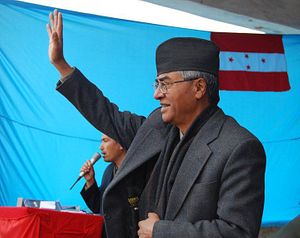Arun Budhathoki

On July 12, the Supreme Court of Nepal overturned Prime Minister K.P. Sharma Oli’s May 21 decision to dissolve the House of Representatives, and issued a judicial writ to appoint Nepali Congress leader Sher Bahadur Deuba as the country’s prime minister as per Article 76(5) of Nepal’s constitution.
This is the second time in five months that the apex court is reinstating the House. It had done so on February 23 as well, after Oli dissolved it on December 20, 2020.
The court’s latest order ends Oli’s three-and-a-half-year stint as Nepal’s prime minister.
Back in May, Deuba and other leaders of the opposition alliance had submitted the signatures of 149 lawmakers, including those of 26 legislators of the Jhala NathKhanal-Madhav Nepal faction of the Communist Party of Nepal-United Marxist Leninist (CPN-UML) to President Bidya Devi Bhandari.
But Bhandari rejected Deuba’s claim to form a new government under Article 76 (5), and went on to dissolve the 275-member lower house at the recommendation of Oli. Snap elections were announced on November 12 and November 19.
Petitions were filed in the court against these controversial decisions. The Supreme Court has ruled now that their decisions were unconstitutional.
According to Bhimarjun Acharya, a lawyer who specializes on constitutional law, the apex court verdict will contribute to “the constitution’s longevity, and with a strongly worded verdict, the court has told the authorities to stop making a mockery of the constitution.”
The ruling, he said “has brought the constitution back on track. All in all, it is the victory of the rule of law, constitutionalism, independence of judiciary and democracy.”
However, the court verdict has also been criticized with some, including Oli, accusing it of judicial activism. Did Nepal’s Supreme Court go overboard in appointing a prime minister?
While the verdict is a victory for Nepal’s constitution it may not bring political uncertainty to an end. Deuba needs to seek a vote of confidence in the House in a month. His position is shaky as Nepal’s largest party, the CPN-UML, is sitting in the opposition. There is no telling what Oli’s next steps will be. Besides, will all the legislators, who backed Deuba, continue to support him in the upcoming vote of confidence?
The Supreme Court order may have put Nepal’s democracy back on track but enormous challenges remain.
According to Dr. Kyungmee Kim, a visiting researcher at the Department of Peace and Conflict Research at Uppsala University, “the lack of inclusiveness and representation of diverse minorities in the country is a threat to consolidate democracy.” While Nepal “has made tremendous progress” with regard to democratization over the past decade, “the progress is stagnant if not under threat due to the emergence of political leaders who have autocratic tendencies.”
In addition, Nepal’s democracy is under pressure from right-wing Hindutva forces in India as also from China’s communists. The Nepal Communist Party (NCP) was formed in 2018 with the blessings of China, and the Oli government that was formed as a result and had the support of the Chinese government and the Chinese Communist Party. Its role in shoring up support for the Oli government throughout the political crisis over the past two years was evident.
As for India, the country is now governed by a right-wing Hindutva nationalist party, the Bharatiya Janata Party (BJP), whose ideological driver, the Rashtriya Swayamsevak Sangh, has often said that it wishes to see Nepal as a Hindu Rastra (state). It is also in favor of the restoration of monarchy in Nepal and the return of ousted king Gyanendra Shah.
A return to the monarchical system or re-establishment of a Hindu state would mean the death of democracy in Nepal, as demonstrations calling for these will intensify as the flow of funding for them grows.
Calls for the establishment of a Hindu state and for restoration of the monarchy are growing in Nepal. This is causing unease among some sections of the Nepali public.
Some leaders of the Nepali Congress support the establishment of a Hindu state. Will Deuba be able to keep them under check? He faces an uphill task in taking Nepal’s democracy forward.
Several tasks, including vaccinating the Nepali population, revitalizing the sluggish economy, curbing corruption, and conducting free and fair elections, await Nepal’s new prime minister.
Oli has been corralled this time around but he cannot be written off. The possibility of Deuba and Oli coming together for the next elections cannot be ruled out. The situation is murky and the future of Nepal’s democracy remains unclear.
No comments:
Post a Comment